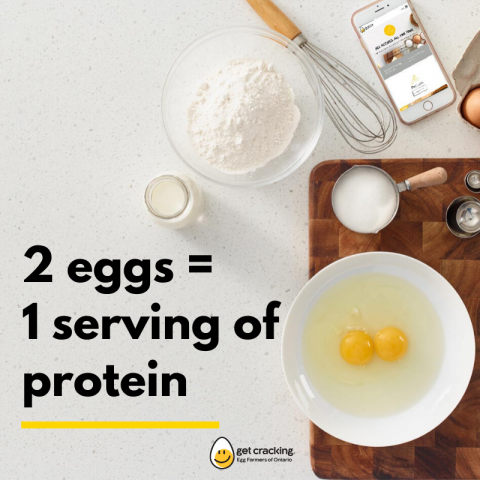"What is an egg's nutritional value?"
Our Answer:
February 24, 2017
Eggs are a great source of many vitamins and nutrients that you need in your everyday life.
One egg will provide 6 grams of high-quality protein and only 70 calories.
Eggs are also a complete source of all nine amino acids that your body needs and are a source of Vitamins A, D, E, B12, Iron, Folate, Selenium, Lutein and Zeaxanthin as well as choline.
Learn more about the nutritional value of an egg from Registered Dietitian Carol Harrison.
FAQs
What are the health benefits of eggs?
Eggs are a highly nutritious food with several health benefits:
High-quality protein
Eggs are an excellent complete protein, containing all nine essential amino acids that our bodies cannot produce on their own. Protein is essential for building and repairing tissues, supporting muscle mass, and maintaining a healthy immune system.
Protein-dense foods are typically high in calories. 1 egg has 6 grams of protein with only 70 calories making it a great low-calorie way to add protein to your diet. To learn more about eggs and protein, read this article.
Vitamins and minerals
Eggs are packed with vitamins and minerals, including vitamin B12, vitamin D, vitamin A, riboflavin, folate, and selenium. These nutrients play crucial roles in energy production, immune function, eye health, and cell maintenance.
Choline
Eggs are one of the best dietary sources of choline, a nutrient that is important for brain health and development. Choline is involved in memory function and helps in the synthesis of acetylcholine, a neurotransmitter that is vital for brain signaling.
Eye health
Eggs contain lutein and zeaxanthin, two antioxidants that are beneficial for eye health. These compounds may help reduce the risk of age-related macular degeneration and cataracts.
Heart health
Contrary to previous concerns about cholesterol in eggs, research has shown that moderate egg consumption does not significantly impact cholesterol levels or increase the risk of heart disease in healthy individuals. Additionally, eggs contain unsaturated fats that can be beneficial for heart health when consumed as part of a balanced diet.
Weight management
Eggs are relatively low in calories but high in protein and other nutrients. Including eggs in your meals can help you feel fuller for longer, potentially reducing overall calorie intake and aiding in weight management.
Skin and hair health
The vitamins and minerals in eggs, particularly biotin, can contribute to healthy skin and hair. Biotin is essential for maintaining the health of your hair, skin, and nails.
What should not be eaten with eggs?
Dietary needs, tolerances and health conditions vary from person to person and will dictate what foods an individual can and cannot eat. This applies to eggs and egg pairings.
It's advisable to consult with a healthcare professional or a registered dietitian to identify the best dietary choices for your individual needs. In general, eggs can be part of a balanced and healthy diet when combined with a variety of nutrient-rich foods that suit your personal preferences and health requirements.
Are eggs inflammatory?
The inflammatory potential of eggs is a topic of ongoing research and discussion. Eggs, like many other foods, contain various components that can influence inflammation in the body. However, the overall impact of eggs on inflammation can vary depending on an individual's health status, dietary patterns, and how the eggs are prepared and consumed.
Eggs are a source of arachidonic acid, an omega-6 fatty acid that can be converted into pro-inflammatory compounds in the body. However, they also contain anti-inflammatory nutrients, such as omega-3 fatty acids, antioxidants, and vitamins, which may help counterbalance any potential pro-inflammatory effects.
It's important to consider how eggs are cooked and what they are consumed with. For example, frying eggs in unhealthy oils or consuming them with highly processed and inflammatory foods like sugary pastries or processed meats may contribute to a pro-inflammatory diet. On the other hand, when eggs are prepared in healthier ways, such as boiling, poaching, or using minimal amounts of healthy oils, and combined with a variety of anti-inflammatory foods like vegetables, fruits, whole grains, and healthy fats, they can be part of an anti-inflammatory diet.
Individual responses to dietary factors, including eggs, can vary significantly. Some people may be more sensitive to certain components in eggs, while others may not experience any adverse effects. If you suspect that eggs or any other food may be causing inflammation or discomfort for you, consider keeping a food diary and monitoring your symptoms to identify potential triggers. If you have concerns about inflammation or specific health conditions related to diet, it's best to consult with a healthcare professional or a registered dietitian who can provide personalized advice based on your individual needs and health status.
How many eggs a day is healthy?
The recommended intake of eggs can vary depending on factors such as an individual's age, overall dietary pattern, health status, and personal preferences.
In the past, there were concerns about the cholesterol content in eggs and its potential impact on heart health. However, research in recent years has shown that for the majority of people, dietary cholesterol from eggs has a minimal effect on blood cholesterol levels and does not significantly increase the risk of heart disease.
As a general guideline, most healthy individuals can safely consume up to 1-2 whole eggs per day as part of a balanced diet without any concerns about adverse health effects. This is consistent with the American Heart Association's recommendation, which suggests that consuming one egg per day can fit within the context of a heart-healthy diet for most people.
Are there any disadvantages of eating eggs daily?
Eating eggs on a daily basis will have a different impact on each person’s health based on their overall food tolerance, dietary needs and underlying health conditions. As with any food, moderation and individualization are key.
For most people, moderate egg consumption, such as 1-2 eggs per day, as part of a well-balanced diet, is unlikely to cause any adverse effects and can be a valuable contribution to overall nutrition.
Is it nutritious to consume eggs and coffee together?
Combining eggs and coffee together in a meal can be considered nutritious, as both foods have their own set of nutritional benefits. However, it's essential to consider how you prepare your coffee and what you add to it, as some coffee beverages can become less nutritious if loaded with added sugars and unhealthy fats.
Let's look at the nutritional benefits of eggs and coffee:
Eggs
- Eggs are an excellent source of complete protein, containing all nine essential amino acids required by the body for various functions, including muscle repair and immune support.
- Eggs are rich in essential vitamins and minerals such as vitamin B12, vitamin D, vitamin A, choline, selenium, and others, contributing to overall health and well-being.
- Eggs provide healthy unsaturated fats, including omega-3 fatty acids, which are beneficial for heart health and brain function.
- Eggs contain lutein and zeaxanthin, which are antioxidants important for eye health.
Coffee
- Coffee is a significant source of antioxidants, such as chlorogenic acid, which can help protect the body from oxidative stress and inflammation.
- Coffee contains caffeine, a natural stimulant that can improve mental alertness and focus.
- Some studies suggest that moderate coffee consumption may be associated with a reduced risk of certain diseases, such as type 2 diabetes and Parkinson's disease.
It's important to consider the following when consuming eggs and coffee together:
Coffee additives
Avoid adding excessive amounts of sugar, syrups, or unhealthy creamers to your coffee. These additions can contribute extra calories, added sugars, and unhealthy fats, reducing the overall nutritional value of the combination.
Balance
While eggs and coffee have their nutritional benefits, it's crucial to incorporate them into a well-balanced diet that includes a variety of nutrient-dense foods like fruits, vegetables, whole grains, and healthy fats.
Individual preferences and sensitivities
Pay attention to how your body responds to the combination of eggs and coffee. Some individuals may find that consuming coffee affects their digestion or energy levels. Others may experience sensitivity to caffeine or have dietary restrictions, such as avoiding eggs due to allergies or ethical reasons.
In summary, combining eggs and coffee in a meal can be nutritious, but it's essential to prepare them in a healthful way and consider your individual nutritional needs and preferences. As with any dietary choice, moderation and balance are key to maintaining a nutritious and well-rounded diet.
Related Questions
Are eggs considered a protein?
How much protein in one egg?
How much protein is in a hard boiled egg?




















